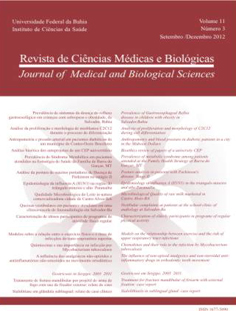Análise bioética dos anteprojetos de um CEP universitário
DOI:
https://doi.org/10.9771/cmbio.v11i3.6172Keywords:
Bioética. Comitês de Ética em Pesquisa. ÉticaAbstract
Objetivo: Verificar o perfil bioético dos anteprojetos do curso de Medicina da Universidade do Estado do Pará enviados ao Comitê de Ética em Pesquisa. Metodologia: Foram estudados os anteprojetos de pesquisa do curso de Medicina enviados entre o período de janeiro de 2006 a novembro de 2010, os quais foram submetidos a um protocolo de pesquisa, no intuito de analisar se os anteprojetos respeitavam a bioética principialista e sigilo, além de verificar-se qual o principal motivo de desrespeito desses princípios bioéticos. Resultados: Foram estudados 488 anteprojetos de pesquisa O sigilo e a justiça foram os quesitos éticos mais desrespeitados. A principal causa do não seguimento da autonomia dos sujeitos da pesquisa foi a de não informar o direito de desistência da pesquisa aos participantes, mesmo após a assinatura do TCLE. Com relação ao princípio da beneficência, o maior equívoco foi o de não informar os benefícios provenientes da pesquisa; quanto à não maleficência, ela foi desrespeitada concernente a não comunicar, aos participantes, os riscos provenientes da pesquisa; o princípio da justiça foi desacatado exclusivamente por não ter sido citado o direito a reparações legalmente estabelecidas no caso da efetivação dos riscos da pesquisa; com relação ao sigilo, a maior dificuldade foi principalmente pela não informação do destino do material coletado após a realização da pesquisa. Conclusão: Após a análise, foram identificados como a maior falha seguir os princípios do sigilo e da justiça, quando comparados em relação aos outros princípios.
Bioethics review of papers of a university CEP
Objective: This paper aims to verify the bioethical profile of the drafts of medicine sent to the Research Ethics Committee at the State University of Para. Methodology: Was studied the drafts of medicine sent between the period January 2006 to November 2010, which were submitted to a research protocol in order to examine whether the drafts respected bioethics principlism and secrecy, and to identify which is the main reason for failure of these bioethical principles. Results: Was studied 488 drafts. The secrecy and justice were the most unrespected bioethical principles. The main cause of failure to respect the autonomy on the drafts was not informing the right to withdraw from the research participants, even after signing the Informed Consent. With regard to the principle of beneficence, the biggest mistake was not to inform the benefits from research; about the not-malfeasance, it was disrespected concerning not communicate to the participants, the risks from the project. The principle of justice was exclusively unrespect because have not been cited the legally established right to reparations in the case of happen the risks of research, with respect to confidentiality, the greatest difficulty was mainly for not informing the destination of the material collected after the research. Conclusion: After the analysis, were identified as the biggest failure to follow the principles of confidentiality and justice, when compared against other principles.
Keywords: Bioethics, Ethics, Research Ethics CommitteesDownloads
Downloads
Published
How to Cite
Issue
Section
License
The Journal of Medical and Biological Sciences reserves all copyrights of published works, including translations, allowing, however, their subsequent reproduction as transcription, with proper citation of source, through the Creative Commons license. The periodical has free and free access.


